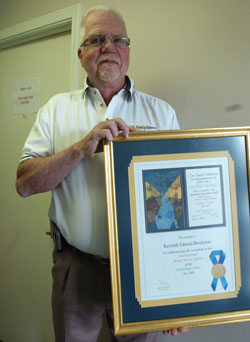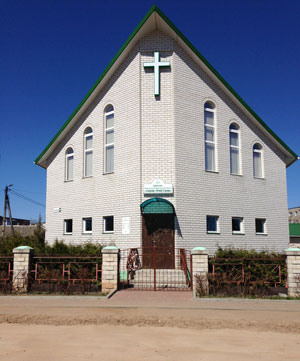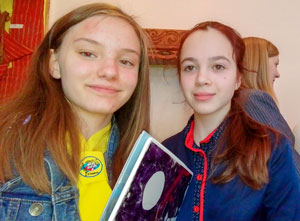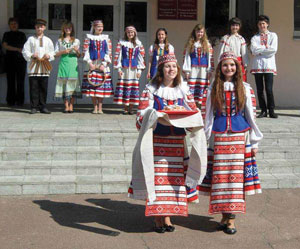Being awarded a Nobel Peace Prize ranks high on the list of accomplishments of Ken Brockman, a Kentucky Baptist layman. But it pales in comparison to the joy he has experienced of mission work in Belarus, a country bordering Russia that was part of the Soviet Union until declaring its independence in 1991.

Chip Hutcheson
Ken Brockman, a Louisville native and West Point graduate, is a Nobel Peace Prize recipient for his work in the peaceful use of nuclear energy.
For instance, there was the time nine years ago when he entered a public school in Belarus. The only Americans those students had ever seen were in movies, and the students said, “The Americans are coming.” As the missionary group left the school, the students said, “Our Americans are leaving.”
Then there was the experience one school day where a young Belarusian girl heard the gospel and told Brockman, “I need Jesus in my life now!”
His passion for ministry in Belarus stems from many years of federal service outside the U.S.
A native of Louisville, Ky., Brockman graduated from West Point and served in the Army for 11 years. Then he went into the private sector and logged a total of 31 years of federal service. He retired in 2005, with the last four years serving as director of the Division of Nuclear Installation Safety for the International Atomic Energy Agency (IAEA) in Vienna, Austria.
That agency was involved in the peaceful uses of nuclear energy, with Brockman overseeing safety aspects of 470 nuclear power plants around the world. He managed a multi-national staff of experts and served as the primary reactor safety advisor to the Secretariat and all IAEA Member States with commercial nuclear facilities.
In 2005, IAEA was awarded the Nobel Peace Prize, addressing issues such as a major problem with sleeping sickness in the southern plains. Brockman was part of the team that traveled to Oslo, Norway, to accept the Nobel Prize.
After retiring from IAEA, he moved to the northern Atlanta area, then in 2013 located to Radcliff, Ky., where he and wife Judy are members of Valley View Baptist Church in Vine Grove, Ky.
While in Atlanta, he became became familiar with Byelorussian Mission, Inc. The Brockmans became active with the Russian community because of his work with the Russians following the Chernobyl nuclear power plant accident in 1986 — an accident that has impacted life in Belarus to this day. After Chernobyl, he worked with the Russians on developing a better response system to such occurrences.
He recalls talking with one of the operators working at Chernobyl on the day of that accident, finding out that the operator had two pages of a Bible. Another person would have a different two pages. “God put the Slavic people on our heart,” Brockman said, resulting in him serving on the board of directors of Byelorussian Mission for years. Since returning to the U.S., he and his wife have made numerous trips to Belarus — most recently returning with a team March 29-April 7. Another team is scheduled to travel there in September.

Submitted photo
Belarus Mission
What can a person expect on a mission trip to Belarus?
“It always seems like a miracle — the conversation never fails to get around to our beliefs and how the Lord works in our lives,” Brockman said. “What is even more
inforcement that the teachers make to our comments. If you want to have a chance to impact young people, the Lord has a spot for you in these venues.”
Last year on a mission trip, some did construction work, others lectured in the medical college, and others shared the Word through English as a second language (ESL) in public schools. Team members visited orphanages and hospitals, hosted meetings to develop business relationships, conducted classes in the state university and reached out to Belarus brothers and sisters at the national library.
In those 10 days, Brockman split time between three cities — Bobruisk, Gomel and Minsk, the capital city. He talked with nursing students about particular challenges they might have during a radiological emergency, such as that seen after Chernobyl. “We had never been invited to Bobruisk before and, through the Lord’s grace, we have been invited back for future presentations,” Brockman said after the September trip.
Brockman then traveled alone to Gomel, spending the week working in the public schools teaching ESL to students.
Brockman was honored to kickoff the Belarus-Museum of the Bible exhibit at the National Library of Belarus. “The exhibit is amazing. The Museum of the Bible (located in Washington, D.C.) brought its traveling exhibit to Belarus, showcasing ancient manuscripts of the Old and New Testament, from both Jewish and Christian origin. This was supplemented by Cyrillic manuscripts provided by the Belarusian national library. The result is a collection that could keep anyone engaged for hours.

Submitted photo
Valley View Baptist’s Mikayla Kovac (left) has been on two mission trips to Belarus. She is pictured here with a young lady named Ksennia, from a public school in Gomel. Ksennia was in the class that Mikayla was working with and had just received a copy of the “Good and Evil” action Bible.
“My task was to kickoff this exhibit; my lecture was on ‘How a Man of Science Could Also Be A Man of Faith.’ We anticipated 50-60 persons would be in attendance. The number was over 100 and people were sitting on the floor and listening from the hallways. A one-hour lecture turned into a three-hour exchange, with questions from both believers and non-believers trying to glean the truth as to the Lord’s calling to all of us.
“More than once, I wondered where my pastor was when I needed him. How do you answer a fellow soldier (I was in the Army) when he asks how do you resolve the conflict between your faith and your call to duty – he was one of those who would have had to launch nuclear missiles, if called upon, during the Cold War? How do you answer a person’s question as to why you believe Jesus was both God and man? All I can say is that the 20-minute Q&A lasted for over two hours – it ended when the library custodian asked us (in no uncertain terms) to, ‘Please, go home. The library is closed!'”
There are many positive signs seen by missionaries. “We observed (in 2017) a men’s rehabilitation center that was being sponsored by the Central Church of Gomel. When we saw it, the building was dark, the kitchen was tiny and the accommodations were dry, but cold. It weighed heavily on my and Judy’s hearts and the whole Byelorussian Missions team. We decided to support this worthwhile ministry with many prayers and some key financial support. The results have been phenomenal. Men have been reunited with their families and with the Lord through baptisms; the facility has been enhanced with an addition for their kitchen, insulated living quarters and an in-progress construction of sleeping quarters that will allow them to double their outreach. Talking with their guests and the pastors and deacons committed to this ministry, I am confident that it will continue to make a difference in ‘men in need’ in the Gomel area.”
The mission team works primarily with the Central Baptist Church of Gomel. The city of Gomel being about 60 miles from the site of the Chernobyl disaster, considered the most disastrous nuclear power plant accident in history, both in terms of cost and casualties. “The impact of Chernobyl is still seen there — there are still low levels of radiation.” Surprisingly, Brockman said Belarus has one of the world’s best blood disorder hospitals. He recalls talking with a young woman there who had a rare blood disorder. She was from Tennessee and had been referred there by Vanderbilt University Medical Center.
Opportunities to share the gospel abound in Belarus
“We do some activities with college students. With my background I have no problem getting an audience at a university,” Brockman noted.
“Our goal is to spread the Word. Russian Orthodox is the official religion in Belarus — the Byelorussian Mission is not a Baptist entity, but Baptists staff it. The mission has helped start over 30 churches in Belarus in the last 10 years, and works with pastors in the country. “We try to support the churches — for instance, if they need a new furnace, we try to help. A teacher there has an annual salary of about $3,000, so when they need a $5,000 furnace, it’s a major expense. We can’t proselytize, but the Lord has provided thousands of opportunities for us to share the Word. The school teachers know about it and have no problem with it. We want to bring strong Christian moral values there.”
Helping orphans and children
Orphan care is a significant focus of missionaries going to Belarus. “We have had over 270 orphans placed in Christian homes there. And we help those families financially,” Brockman added. “Just $250-$300 will allow placing a child into a family and supporting them,” he said.

Submitted photo
Students in traditional Byelorussian dress welcome missionaries, offering traditional “bread and salt” as a special welcome to honored guests. In the foreground are two students from Gomel Public School 36.
Another entity working to help people in that country is American Belarussian Relief Organization (ABRO), which Brockman says is comprised of people working with Byelorussian Mission. The program focuses on helping children in Gomel, taking them out of the country for six weeks every summer. The organization says the program allows an American family “the opportunity to be a part of international missions without ever leaving home. (Belarusian) children get to see first hand what it means to be a follower of Christ, opening the door for them to accept Christ and take Him home to their own country.”
Brockman said that taking a child from Belarus for six weeks can significantly improve a child’s physical well-being after long-time exposure to low levels of radiation, noting that it results in “80 percent purification” of their blood. There are higher-than-normal thyroid problems and cataracts in Belarus residents, attributed to the long-term low level of radiation exposure. “Having a child here in the U.S. resets their biological clock,” he said.
“We only place them in Christian homes — it costs $1,750 to bring a child in, and that includes their airfare, visas, etc. Once a family has a child come one time, they want them to come back next year. After a child has been in a Christian home, they see what it’s like. They’ll return to their home and when the family sits down to eat a meal, the child will say, ‘we hold hands and we say a prayer.’ You can train a missionary in your home and save a soul — win them to Christ and send a missionary.”
Bible education
Byelorussian Mission volunteers use Bibles in several languages as well as Experiencing God materials, but the most basic tool used is a Bible with the title “Good and Evil.” It is a top-quality, slick-paper product labeled as the “ultimate comic book action Bible.” Brockman counters that it is not a comic book, but a quality illustrated Bible that has great appeal to young people. It is used to communicate to divergent language groups and reach disadvantaged people, delivering the message of Christ through “graphic novel” format.
“Young people devour it — we give out 6,000 to 7,000 a year,” Brockman said. “The English version costs $25, and for each one purchased the printer donates one printed in the Russian language. This Bible combats the problem of art which is poorly done or too expensive. We give them out in schools. I’ve given them out on a Tuesday, and by Thursday I will have students want to discuss what they have read.”
Next trip planned for September
When Brockman and other missionaries return to Belarus in September, they will join the city of Brest in celebrating its 1,000th anniversary as a city. Brest will also be the site of the sixth pastors conference conducted by Byelorussian Mission, whose representatives have been working with the country’s ambassador to the U.S. and the mayor of Brest to “break down political barriers.”
Chip Hutcheson